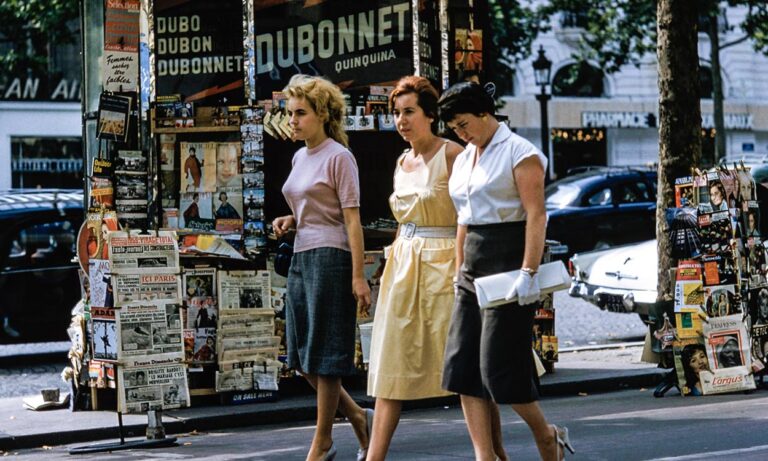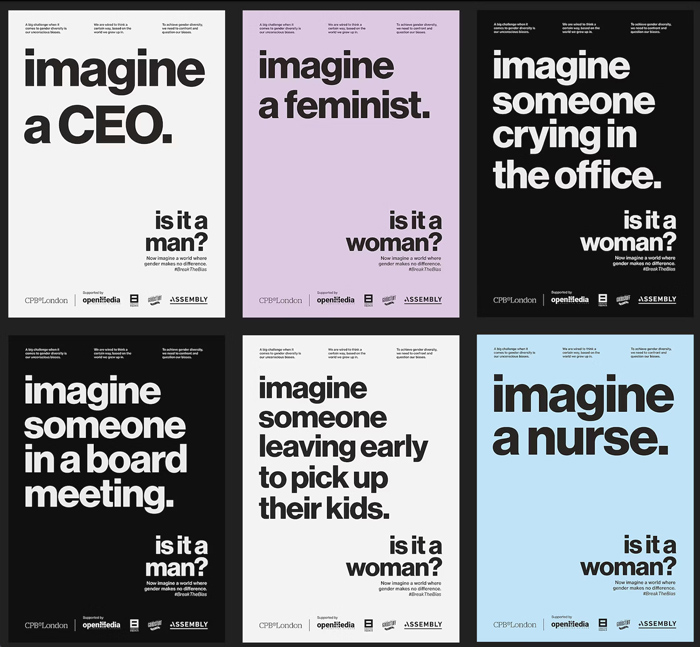The return of the stereotype: Why sexist ads are on the rise and how we can make them history

Since the inception of the internet in the early 90s, a lot of work has been done to tame the once lawless desert and to challenge tired gender stereotypes that reinforce norms and expected behaviours that were all too prevalent on the early interweb.
More and more advertising companies are stepping up to reflect the multifaceted society we live in, releasing commercials that reflect gender roles and gender identification as a spectrum. Just check out this Christmas advert that was released by Spanish whiskey company J&B back in 2022:
This is lovely and also sad and also hopeful https://t.co/YB8hkDlCSS
— Lorraine (@reallorraine) December 5, 2022
And yet, while we have amazing ads like this one going viral online, magazines, TV, billboards and more recently, a number of social media ads are still playing a huge part in reinforcing what’s considered ‘traditional’ gender roles for men and women.
Analysis company CreativeX just released research figures gathered using AI, looking at countless commercials from huge brands. It found that traditional gender stereotyping is still everywhere—in fact, it’s becoming more prevalent.
CreativeX analysed content from TikTok, YouTube, Snapchat, Facebook and Twitter across 2022, gathering a whopping 10,885 ads featuring over 20,000 people from food and beverage, healthcare, and alcohol brands.
The facts? The number of women portrayed in domestic or family settings has more than doubled in the last year. It’s gone up to 66 per cent of the 10,000 ads analysed in 2022, compared to just 32 per cent in 2021.
Looking around, you might’ve assumed that representation problems were slowly being redressed. Back in December 2018, the UK’s main advertising regulator, the Advertising Standards Authority (ASA) gave agencies six months to eliminate stereotypes.
@jeremy_webb Follow for more #advertising #marketing #fyp #foryoupage #nightlife Credit: Publicis Italy
♬ original sound - Jeremy on Advertising
After one too many explicitly stereotypical ads went viral, it officially became unlawful to utilise gender stereotypes to sell products. Remember Protein World’s ‘Are you beach body ready?’ Summer campaign fail? Ick.
In 2019, The Royal Air Forces’ ‘No Room for Clichés’ campaign highlighted that “every role in the RAF is open to everyone.” Then, in March 2022, you might’ve spotted the ‘Imagine’ poster campaign in the cinema, on social media or at a bus stop, highlighting everyday bias.

Unfortunately, however, these incremental changes didn’t have a big enough impact, because the percentage of women being portrayed in professional settings decreased from 16 per cent in 2021, to just 7 per cent in 2022.
And then there’s the issue of skin tone bias. Across all ads CreativeX analysed, women with darker skin tones were found to feature 80 per cent less than women with the lightest skin tones. These same women also appeared 58 per cent less frequently in professional settings than lighter-skinned women.
At the same time, multi-faceted brands are increasingly leaning towards impactful Pride campaigns and equality for all. Household names like McDonald’s, LEGO and Tinder proudly fly the rainbow flag and release Pride-related products and initiatives come June. Although, there’s also an argument to be made that it isn’t good enough for these brands to simply participate in ‘rainbow-washing’ when it’s convenient to their sales strategy.
TikTok, Meta, Snap Inc. and YouTube make strides to support their respective communities with tailor-made features. But, at the same time, they’re running ads that back up the very stereotypes they’re hoping to break down.
Anyone who spotted the recent outrage sparked by beer company Bud Light’s partnership with transgender influencer Dylan Mulvaney can see that the fight to end gender bias and inequity within both advertisements and society is far from over.
@cravencourtney we love an inclusive queen💁🏼♀️ #budlight #coorslight #dylanmulvaney #greenscreen #greenscreenvideo #ford
♬ original sound - Courtney Craven
On top of all this, trends on the very platforms purporting to support women and other communities aren’t helping. TikTok is full to the brim of aspirational “stay-at-home girlfriend” videos which depict women glamourising being financially dependent and satisfied through servitude.
Feminism is 100 per cent based on the right for a woman to choose her path in life, but it’s dangerous to reaffirm the idea that women are best suited to staying home and “taking care” of their male partner while they go out and “get that bread.”
@kendelkay cooking and cleaning are my favorite acts of service 👩🏼🍳🫶🏼
♬ original sound - kendel kay
SCREENSHOT recently spoke to Sofie Birkin, a queer artist and illustrator who’s made it her mission to tackle gender stereotyping, ableism and skin tone bias when lending her talents to global ad campaigns for brands.
View this post on Instagram
Birkin wants everyone who identifies as a woman to feel represented and seen. She’s worked with the likes of Adidas, Benefit Cosmetics, Apple, Nike, Google and even the United Nations—encouraging clients to champion images which don’t diminish women to reductive stereotypes.
The expert explained: “As an artist frequently working with brands, the uptick in the romanticisation of women performing domestic labour concerns me but doesn’t surprise me.”
Birkin continued: “In the last few years we’ve seen capitalist production repackaged as essential to glamorous, algorithm-pleasing micro identities. You can be ‘that girl’, a ‘clean girl’ or (god help us) a boss bitch, as long as you’re optimising your mind, body and spirit to be as (aesthetically) productive as possible.”
@elainamich Happy April!! 🌷 Timestamped original sound morning routine asmr ft. my lash appt 🤍 tysm @narscosmetics for making my day! #morningroutine #dailyvlog #dailyroutine #officelife #skincareroutine #lifestyle #relatable #minivlog #cozy #asmrsounds #cleangirl #cleangirlaesthetic #vlog
♬ original sound - Elaina
With our attention pulled in so many directions on a daily basis, it’s easy to understand the draw of simple pleasures and calming daily routines. Birkin noted: “Hustle culture is exhausting—it’s no wonder there’s a hunger for simplicity, mindfulness and a slower pace of life. The worrying side effect of this is bad actors exploiting that desire to push a regressive agenda. Making your boyfriend a packed lunch every day is now ‘leaning into your divine feminine’ and brands capitalise on that with tips like ‘Here’s 10 cute kitchen storage solutions to help you do it!’”
@divinelyfeminine #thatgirl #feminineenergy #divinefeminine
♬ original sound - bestspedup
Reflecting on how brands have used this technique previously, the illustrator mused: “In the pursuit of an easier life we’ve ended up right back at having to level up our reality through our purchases. It’s exactly what happened in the post-war mid-century period. Burned out and traumatised from the demands of wartime, companies found ways to commodify women’s human need for peace and control into shiny kitchen gadgets and processed foods to feed their families with.”
There are however some brands out there finding ways to creatively market to women without being condescending. One example would be the campaign Birkin worked on with women’s razor brand Billie in 2021.
View this post on Instagram
Reminiscing on the campaign, Birkin recalled how she ended up “illustrating a queer Rapunzel with a shaved head and magnificent armpit hair!”
In terms of looking to the future, Birkin wants to see companies prioritising “critical awareness of the cultural moment we’re experiencing,” and focus on giving “creative freedom to artists and photographers who are creating empowering, nuanced and inclusive images of women.”




